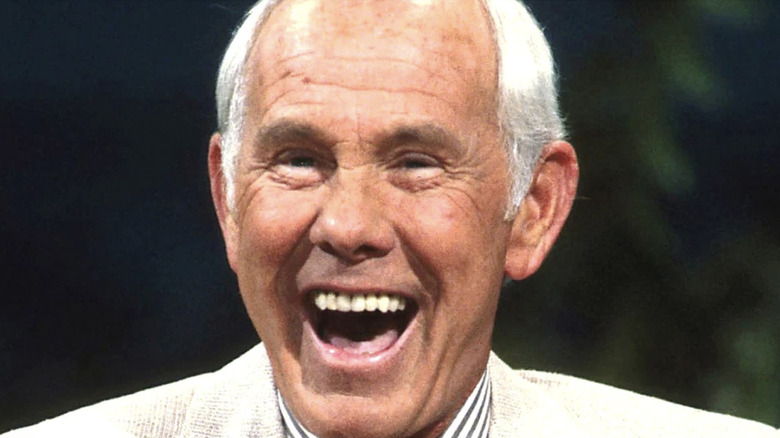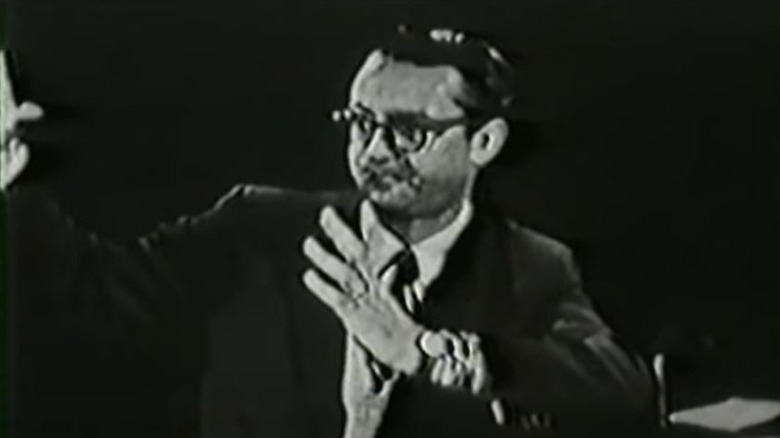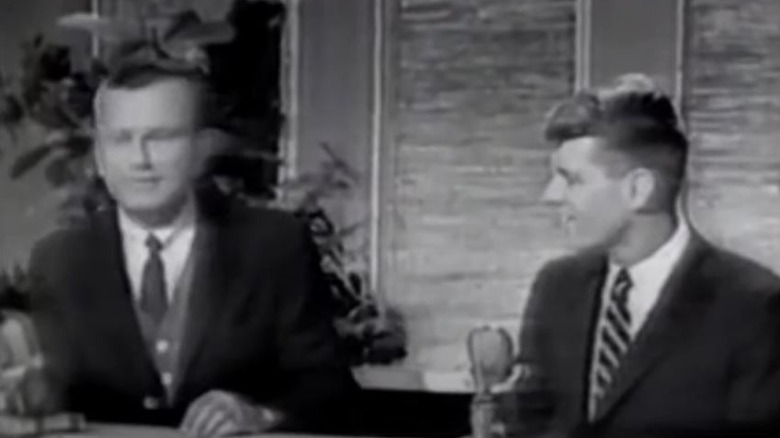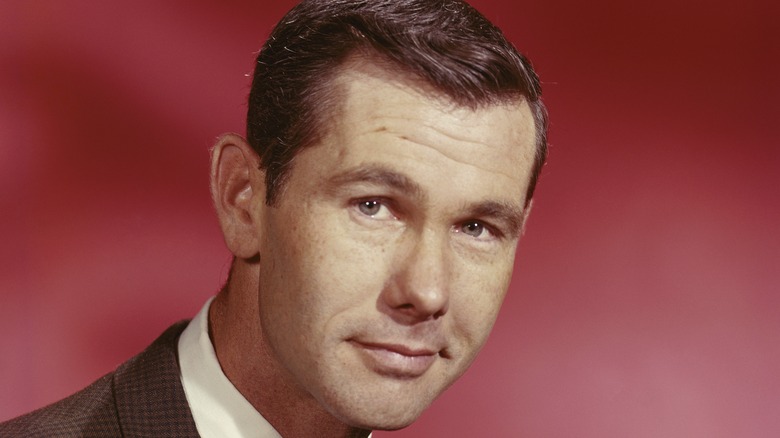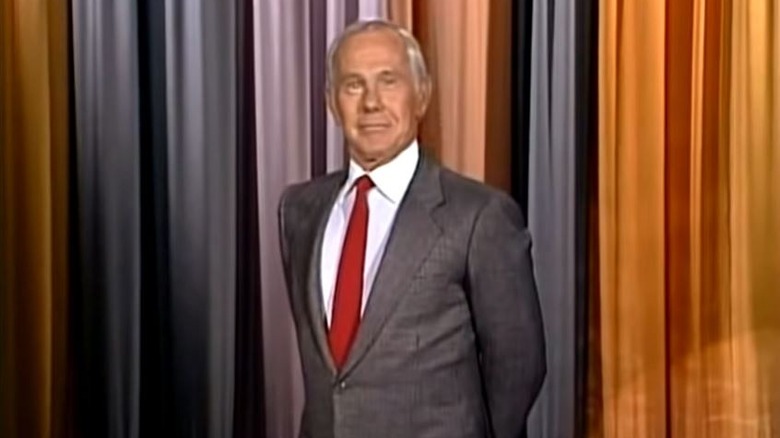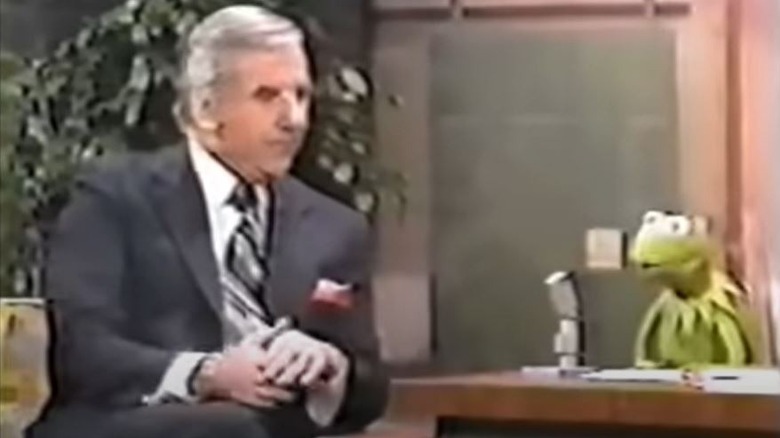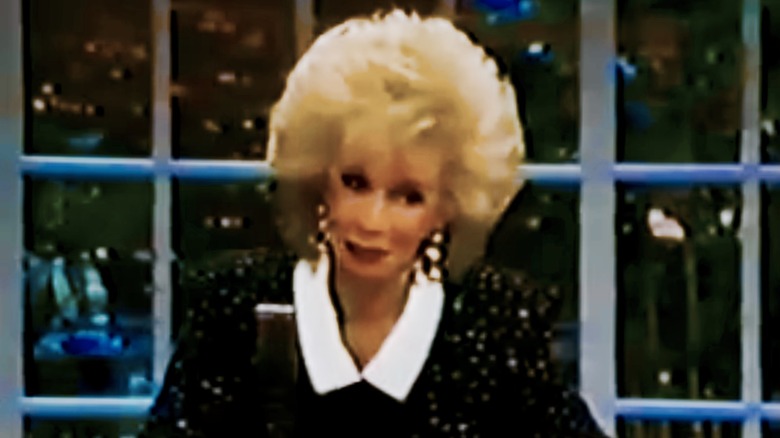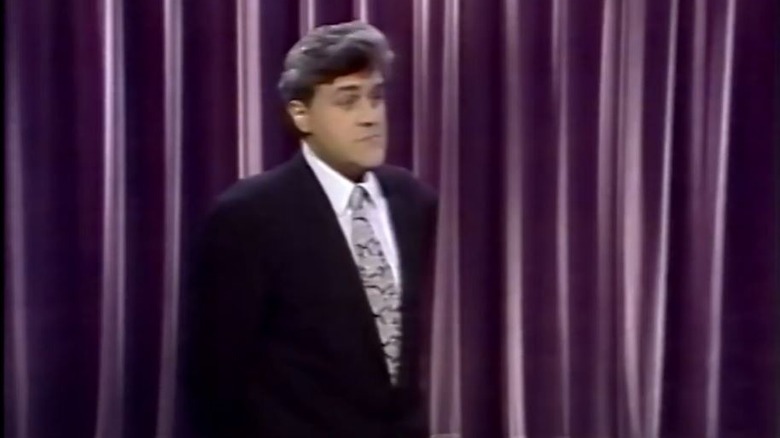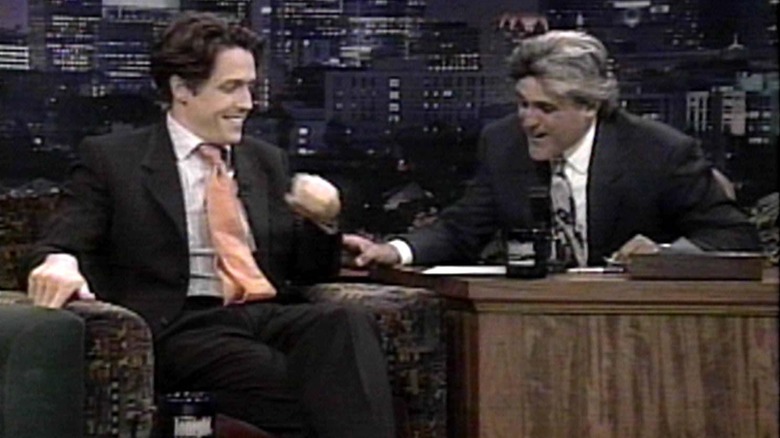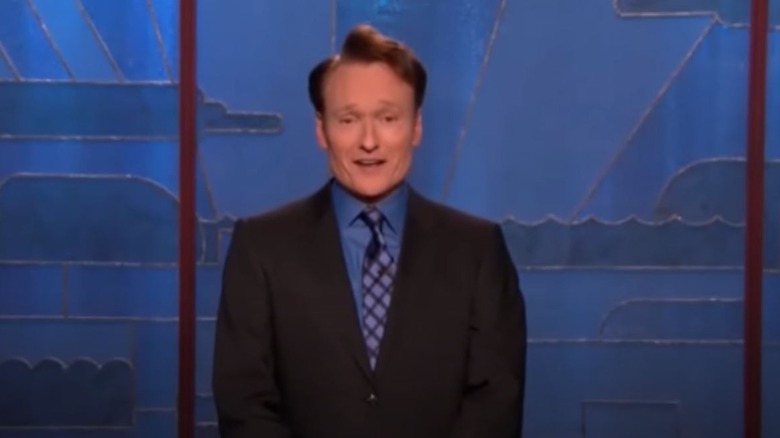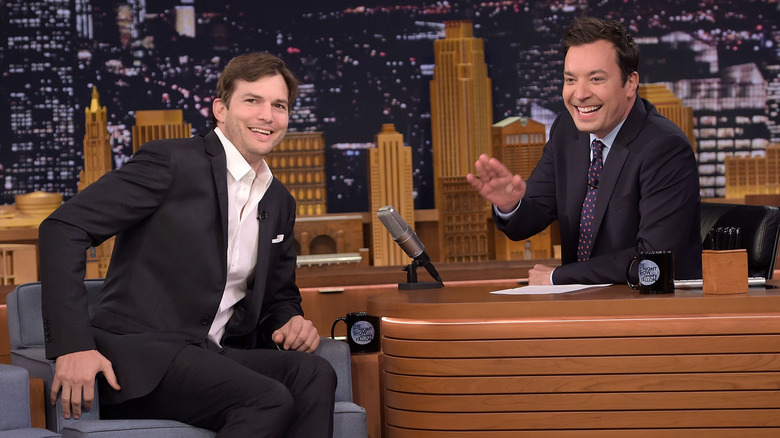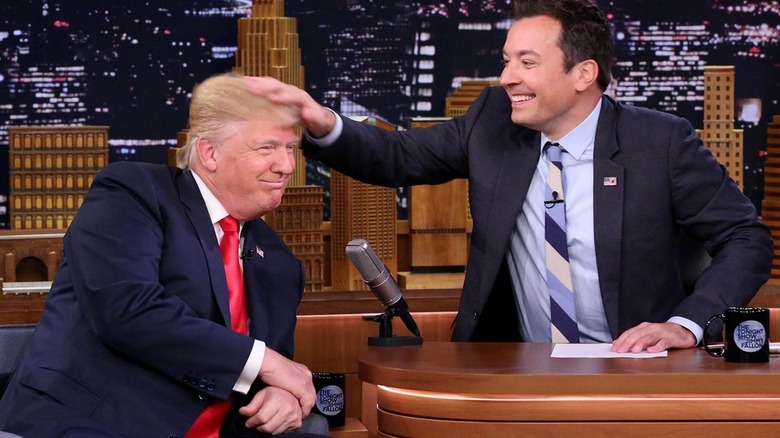The History Of The Tonight Show Explained
On the first ever broadcast of what we now call "The Tonight Show," host Steve Allen quipped "I want to give you the bad news first. This program is going to go on forever."
At the time, he was referring to the 90 minute runtime late at night — but decades later, it turns out he was downright prophetic. In the decades since, "The Tonight Show" has stood the test of time as both an American institution and the map for late night talk shows worldwide.
As with any institution over half a century old, there's a long and winding story behind it all, one with no shortage of confusion, controversy, and celebration.
"Tonight" has bounced between locations, going from New York to Los Angeles and eventually back to New York. It has stood alone, unchallenged atop the ratings — only to be torn asunder by feuds that divided its crew and audience loyalties not once, but twice. Here, we look back on the weird, wild stuff that has defined the history of "Tonight."
Steve Allen stars the show
"The Tonight Show" was the brainchild of NBC executive Sylvester "Pat" Weaver, who created "Today" in 1952, the first morning show and one that's still on NBC to this day.
Two years later, Weaver decided to create original programming past 11 pm, and since the "Today" mix of news, interviews, and light entertainment had been a hit, he had a blueprint. Simply called "Tonight," the show was born in 1954 and hosted by comedian Steve Allen, who had been running a popular variety show on NBC's New York City affiliate.
Allen was the George Washington of late night: everything he did set a precedent, most of which is followed in some form to this day. In addition to an opening monologue and celebrity interviews, Allen took the show out of the studio for man-on-the-street interviews. He was also known for various surreal stunts, including getting covered in tea bags and dipped into a vat of hot water.
Allen's antics kept the show popular, but producer Jules Green cut a deal that made talk shows a moneymaker for decades to come: all guests, big or small, were paid the union scale for an appearance. This allowed the network to invest most of its money into the host, while other expenses were low and largely fixed.
The show was a big success, making Allen such a household name that NBC decided he'd be more marketable in primetime. He was given his own show on Sundays called "The Steve Allen Show" (NBC hoped it could take on "The Ed Sullivan Show"), and started spending more time there, eventually saying goodbye to "Tonight" in 1957.
Jack Paar raises the ba(a)r
After Allen's departure, the format of "Tonight" was altered and it became something of a news magazine. When that failed, NBC returned to the formula they knew worked, this time with a new host: Jack Paar.
Rechristened "The Jack Paar Tonight Show" in 1957, Paar made "Tonight" a country-wide sensation. Looking back in 1992, TV critic Tom Shales said that Paar "put late-night on the map as a profitable part of the broadcast day."
Paar was known for two traits that went hand-in-hand: his excellent conversational skills, and his emotional volatility. Going beyond mere hosting of actors or celebrities, Paar held his own opposite politicians, intellectuals, and anyone he deemed a great storyteller. He also never shied away from controversy — in 1959, shortly after the Cuban Revolution, Paar took a camera crew to Havana and interviewed Fidel Castro. He also visited West Berlin as the Berlin Wall was being constructed.
Also known for his emotional outbursts and combative behavior (which only seemed to make him more compelling), Paar had public feuds with gossip columnists Dorothy Kilgallen and Walter Winchell, and is often credited with killing the latter's career.
The best example of his volatility — and perhaps the most storied part of his tenure — was when he quit on air. Paar told a joke in which "W.C." (water closet, a European term for "bathroom") was mistaken for "Wayside Chapel." NBC censored the joke, considering a toilet joke too obscene. The next night, Paar — on the verge of tears — expressed his anger with NBC and quit. He returned five weeks later, opening his return with "As I was saying before I was interrupted..."
Paar left the show in 1962, burned out by the schedule.
The rise of Johnny Carson
After Paar's departure, NBC didn't have to look hard to find the right man for the job: they eyed Johnny Carson early. Carson had filled in as guest host before, and had turned down the job at least once, but NBC was sure of him. At the time, he was the host of the hit ABC quiz show "Who Do You Trust?", where his quick wit marked him as one of the funniest hosts on TV.
In addition to his obvious talent and good looks, Bill Carter wrote about another important factor: Carson was a midwestern WASP. "Nobody ever articulated why that mattered. But much of television comedy was still the province of ethnic comics, and this was a national show being sent into homes where a sizable portion of the audience was either already in bed or headed that way. The intimacy that implied seemed to underscore the need to find a star who was comfortable to the mass of viewers — and their mass prejudices."
Carson agreed, but he was contractually obligated to host his game show for 26 more weeks. NBC waited it out, and their judgement proved correct shortly after he started in October of 1962. "Tonight" almost immediately reached new heights in the ratings, and Carson's monologues became the stuff of legend. His natural comedy instincts made him a hit, and the show was popular enough that merely appearing on it was a star-making endeavor. The show was such a success that, over the years, it was known to sometimes generate up to 20% of NBC's revenue.
Carson almost quits
In 1979, Carson wanted out of "Tonight." He was tired of the grind, especially the onerous 90 minutes of programming each night, and tried to get out of his contract on a technicality. This set off a year long battle between NBC and Carson over the show.
Carson started covertly listening to offers from other networks, with ABC in particular making a blow-away offer. NBC began weighing their options in case Carson left, and network chairman Fred Silverman admitted to People Magazine that frequent guest host David Letterman was a strong candidate — so strong, in fact, that Letterman was given a morning show, both to keep him under contract and act as a test run.
By May of 1980, with Carson inches away from quitting, he and NBC resolved their differences and worked out a deal.
It was a lucrative one for Carson: $5 million a year, Mondays off, and the show was cut to a manageable 60 minutes. Carson also now had ownership of "Tonight" and the new timeslot afterwards.
Meanwhile, Letterman's morning show bombed within months, but NBC nevertheless gave him a holding contract. Realizing there was a market for young fans watching TV at unusual hours, they announced a new show that would follow "Tonight" starting in 1982: "Late Night with David Letterman."
Guest hosts
Guest hosts were already a regular part of "The Tonight Show" pre-Carson. Ernie Kovacs would regularly fill in for Steve Allen, and NBC often had to find talent to cover Paar. Carson, however, made guest hosts a part of his brand.
During the '70s, he had a revolving door of them. Some of them would stay for a whole week, like Harry Belafonte. Others would be one and dones, like Kermit the Frog — no, really. Dozens of people, ranging from Joey Bishop to McLean Stevenson, had dozens of their own appearances behind the desk.
After Carson's contract gave him a lighter workload, he settled into two permanent guest hosts. First, from 1983 to 1986, fans would tune in on Mondays and see Joan Rivers hosting the show. After her acrimonious departure, the show started rotating again, usually bringing in names like David Brenner and Garry Shandling. Then from 1987 onward, Jay Leno moved into the permanent spot.
Guest hosting has been increasingly rare in the years since Carson. During Leno's entire combined tenure at "Tonight," he only had one guest host — Katie Couric — and that was as part of a publicity stunt. Even outside "Tonight," most guest hosts only appear when the host is unavailable for medical reasons, like when Harry Styles guest hosted "The Late Late Show" when James Corden's wife went into labor.
Meanwhile on CBS, David Letterman experimented with guest hosts in the summer of 2003. What does this have to do with "Tonight?" One of those guest hosts was a "Saturday Night Live" cast member named Jimmy Fallon.
Aiming for Carson's throne
It's not a surprise that so many tried to replicate the late night talk show format — it's a low expense, high profit endeavor that's easy entertainment. What's more surprising is that people kept trying to take on Carson and "Tonight" directly.
Many tried over his nearly three decades on the air. Every single one of them failed, almost always in spectacular fashion. Carson had many imitators in the '70s — Merv Griffin, Dick Cavett, Joey Bishop — some of whom found success when they were directly against him.
But the most notable and infamous attempts occurred in the 1980s.
Carson, for the first time, looked vulnerable: changing technology meant that networks had to compete with the cable boom and video cassettes. By 1982, Fred Silverman had been jettisoned from NBC and smelled blood. He responded by creating a syndicated talk show: "Thicke of the Night," starring a then-unknown (at least to America) Alan Thicke. The show attracted awful reviews and worse ratings, once watched by so few people that Nielsen couldn't even assign ratings to it in some locations. It got axed after only a few months.
Later, in 1986, Joan Rivers felt disrespected by NBC. She thought she was paid too little for her work and was disregarded by network execs. After finding out she wasn't even on NBC's radar as a possible Carson replacement, she accepted an offer at Fox — then a nascent fourth network — for her own talk show: "The Late Show starring Joan Rivers." She didn't speak with Carson before doing so, a fact Carson resented so much that he never spoke to her again and banned her from "Tonight" — a ban Leno honored, and was only lifted under Fallon. "The Late Show" collapsed amid fights with the network.
Some shows in the late '80s and early '90s, like "The Arsenio Hall Show," did find success, almost entirely by targeting a younger audience or trying to wait it out until Carson left.
Carson abdicates, Leno and Letterman battle
On May 23rd, 1991 at Carnegie Hall, NBC presented the upcoming television slate to affiliates and advertisers. The guest of honor was Johnny Carson, who made an announcement that surprised everyone in the building: this would be his last year on air. He decided it was just a natural time for him to retire, and it set the network on a mad dash to handle the situation. The next year saw a behind the scenes power struggle between Leno and Letterman for who'd inherit the show, a battle chronicled in Bill Carter's "The Late Shift" and an HBO movie of the same name.
Carson always envisioned Letterman as his successor, and Letterman had dreamed of hosting "Tonight" for decades, but NBC had reservations. They were concerned about Letterman's behind-the-scenes perpetually grouchy demeanor, especially in contrast to Leno's amiability. Some also wanted to keep Letterman at 12:30, figuring his offbeat style fit better in the more protected slot.
Meanwhile, Leno's manager Helen Kushnick used cutthroat tactics to guarantee her client "The Tonight Show." Well before Carson even went to Carnegie Hall, Kushnick and her allies planted a false story in the press that NBC was trying to push Carson out. She also secretly arranged a contract with the top level brass at NBC promising Leno "The Tonight Show" once Carson abdicated, signed a mere seven days before Carson's announcement. Even so, it was no sure thing — Kushnick's abrasive behavior almost tanked everything, famously leading Leno to hide in a closet and eavesdrop on executives discussing his future.
Ultimately, Leno was given "Tonight." Letterman, heartbroken and furious, bolted to CBS and started "The Late Show" opposite "Tonight."
Leno flounders until Hugh Grant
Leno may have won "The Tonight Show" but for the first couple years of the Late Night Wars, Letterman handily defeated him. Letterman had three distinct advantages over Leno: public sympathy, a built-in audience, and experience running a talk show. Meanwhile, Leno had to build his own version of "The Tonight Show" from scratch.
Slowly but surely, however, Leno began to catch up with Letterman. Some of it was NBC's strong primetime slate, where "Tonight" got promoted during a couple exciting new shows called "ER" and "Friends." Part of it was Leno firing Kushnick a few months into the program after her abrasive behavior finally caught up with her — she had destroyed staff morale, and word about her vicious habits leaked to the press. A lot of it was simply Leno learning how to run his own show, once telling a journalist that "The first six months was 'Tonight Show' by committee."
But his biggest victory — his coronation, even — would come in the summer of 1995.
In June of 1995, actor Hugh Grant was caught with a sex worker on Sunset Boulevard. The arrest made headlines just as Grant was embarking promotion for "Nine Months." It just so happened that Grant was booked as a guest on "Tonight" a couple weeks later, on July 10th. A fluff interview suddenly became must see TV. Leno opened the interview with "What the hell were you thinking?" and an embarrassed Grant squirmed through an apology.
The episode drew monster ratings, trouncing "The Late Show" for the first time. It was a trend that continued: for the rest of Leno's run, save a few shows here and there, "The Tonight Show" was the clear ratings lead in the time slot.
Tonight Show Conflict Part 2: Enter Conan O'Brien
Conan O'Brien took over "Late Night" after Letterman left NBC, and over the next decade-plus turned it into the hippest talk show on television. Circa 2001, Fox reached out to O'Brien and offered him a show earlier in the night. O'Brien turned them down, both wanting to preserve his body of work and because he still had his eyes on "Tonight." This started the second Tonight Show conflict, detailed in Carter's book "The War For Late Night."
Fast forward to 2004, when Leno and O'Brien needed new deals, and NBC was again at a crossroads. Both men were extended four years, after which Leno was expected to leave and O'Brien would get "Tonight." Though both men played nice since Leno didn't want another messy move, in private Leno was confused and heartbroken. He and NBC eventually decided that he'd instead launch a 10pm talk show titled "The Jay Leno Show."
In late 2009, "The Jay Leno Show" had become a certified ratings bomb, while O'Brien's "Tonight Show" had spent several months trying to broaden its audience. Affiliates, furious about their shrinking numbers, demanded NBC do something. In an attempt to appease everyone, NBC decided to cut a half hour from "The Jay Leno Show," put it at 11:35, and push "Tonight" past midnight.
O'Brien rejected this plan, putting out a press release saying "The Tonight Show at 12:05 simply isn't the Tonight Show," and that he didn't want to push back "Late Night" or its new host, Jimmy Fallon. O'Brien then mocked NBC on air, saying "You can do anything you want in life ... unless Jay Leno wants to do it, too." That led to a settlement instead of a compromise, making O'Brien far and away the shortest tenured host.
Leno returns and Jimmy Fallon inherits the show
Ultimately, O'Brien didn't have the leverage: his contract didn't guarantee an 11:35 start time, a clause originally meant to include pre-emptions for sports and special events. O'Brien had the support of the public, most of Hollywood, and almost every competing late night host, but it didn't matter. O'Brien was bought out of his contract and Leno resumed hosting "Tonight" after the 2010 Winter Olympics.
Though ratings improved under Leno and went back to number one, his already tenuous reputation took a permanent hit. NBC also took a hit, especially network president/CEO Jeff Zucker — whose attempts to placate everyone instead hurt all parties involved — and it partially contributed to him losing his job there. Ultimately, though, Leno's second tenure is better remembered as a transitional period to the biggest host in years: Jimmy Fallon.
Fallon inherited "Late Night" after O'Brien left for the big seat. His selection and first few months were met with skepticism and derision, but he slowly carved out his own niche. He was also one of the first hosts to use social media in any meaningful way, which grew his following. Fallon's sketch comedy credentials, knack for impressions, and general fun loving nature were an effective mix, so NBC moved him to 11:35 in 2014 — with Leno's involvement and blessing.
Fallon's "Tonight" came out of the gate strong and stayed number one for several years. Even after Letterman retired and Stephen Colbert took over "The Late Show" (a tenure that started low rated and shaky), Fallon reigned supreme. He even brought in the coveted 18-49 demographic. The only thing that could stop him was himself ... or a head of bad hair.
Ratings plummet after a Trump interview
On September 15, 2016, Fallon interviewed Republican Presidential nominee Donald Trump. It was a softball interview, with no mention of Trump's endless controversies, and included Fallon tousling the future president's hair to prove it was real.
The ordeal was widely criticized by the press and fans for both normalizing a man running on racism, sexism, and xenophobia and exposing Fallon's lack of anything resembling the gravitas of someone like, say, Jack Paar. At first, Fallon shrugged it off, but as it continued to plague him, he expressed remorse in 2018. Regardless, his show took a hit, and it has yet to recover.
While the hair incident damaged his reputation, it was also a symptom of a bigger problem: the growing appetite for political comedy. Fallon, by his own admission, is not a political comedian — and the Trump era saw an endless appetite for political humor instead of goofy party games. Tastes change, and Fallon never quite adapted.
Meanwhile, Colbert had years of experience in this field. Slowly but surely, Colbert overtook Fallon in the ratings — first overall, and then in the coveted 18-49 demo. Fallon, meanwhile, lost one fifth of his audience between 2016 and 2018. By 2019, "The Late Show" was narrowly the ratings leader for the first time in years.
In June of 2018, after Fallon apologized for the interview, Trump fired off a tweet claiming Fallon called him to brag about "monster" ratings. Fallon denied calling Trump, and said during his monologue "By the way, Donald, I don't know if you've seen my ratings the last two years —— it didn't help. Really, thanks a lot. Thanks for nothing. Help someone else!"
